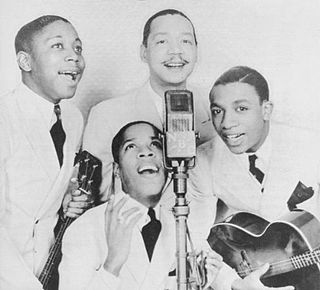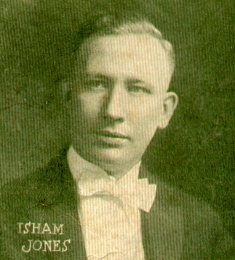"It's Funny to Everyone but Me" is a song with words and music written by Jack Lawrence in 1939. It was recorded by The Ink Spots on May 17, 1939.
Jack Lawrence was an American songwriter. He was inducted into the Songwriters Hall of Fame in 1975.

The Ink Spots were an American pop vocal group who gained international fame in the 1930s and 1940s. Their unique musical style presaged the rhythm and blues and rock and roll musical genres, and the subgenre doo-wop. The Ink Spots were widely accepted in both the white and black communities, largely due to the ballad style introduced to the group by lead singer Bill Kenny.
It was also recorded by Frank Sinatra with Harry James & his Orchestra on August 17, 1939. It was one of the songs of Sinatra's developing repertoire. [1]

Francis Albert Sinatra was an American actor, producer, and singer who was one of the most popular and influential musical artists of the 20th century. He is one of the best-selling music artists of all time, having sold more than 150 million records worldwide.

Harry Haag James was an American musician who is best known as a trumpet-playing band leader who led a big band from 1939 to 1946. He broke up his band for a short period in 1947 but shortly after he reorganized and was active again with his band from then until his death in 1983. He was especially known among musicians for his technical proficiency as well as his tone, and was influential on new trumpet players from the late 1930s into the 1940s. He was also an actor in a number of films that usually featured his band.
In 1960, Dinah Shore included it on her album Dinah Sings Some Blues with Red . [2]

Dinah Shore was an American singer, actress, and television personality, and the top-charting female vocalist of the 1940s. She rose to prominence as a recording artist during the Big Band era, but achieved even greater success a decade later, in television, mainly as hostess of a series of variety programs for Chevrolet.

Dinah Sings Some Blues with Red is studio album by singer Dinah Shore and vibraphonist Red Norvo and his quartet. It was released in 1960.
In 2017, Bob Dylan released a version of the song on his album Triplicate .

Bob Dylan is an American singer-songwriter, author, and visual artist who has been a major figure in popular culture for six decades. Much of his most celebrated work dates from the 1960s, when songs such as "Blowin' in the Wind" (1963) and "The Times They Are a-Changin'" (1964) became anthems for the Civil Rights Movement and anti-war movement. His lyrics during this period incorporated a wide range of political, social, philosophical, and literary influences, defied pop-music conventions and appealed to the burgeoning counterculture.

Triplicate is the 38th studio album by Bob Dylan, released by Columbia Records on March 31, 2017.
This song should not be confused with another of the same title written by Isham Jones in 1934, with lyric by Dave Franklin. Jones recorded it with his orchestra in 1934 but it was not successful.

Isham Edgar Jones was an American bandleader, saxophonist, bassist and songwriter.
Dave Franklin was an accomplished American songwriter and pianist. A member of Tin Pan Alley, Franklin co-wrote "The Merry-Go-Round Broke Down," which was adopted as the theme song to the Looney Tunes cartoon series. His primary collaborator was lyricist Cliff Friend. His other collaborators included Al Dubin, Isham Jones, Irving Taylor. Franklin worked in vaudeville and night clubs in the U.S. and Europe. According to The Complete Encyclopedia of Popular Music and Jazz, 1900–1950, by Roger Kinkle, he left school at 13 to work as a pianist in a publishing house. Some of his songs were recorded by Glen Gray, Isham Jones, Guy Lombardo and Frankie Trumbauer!




